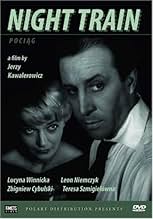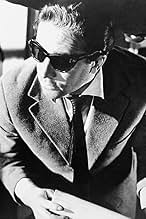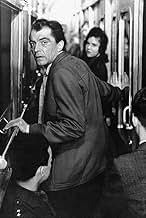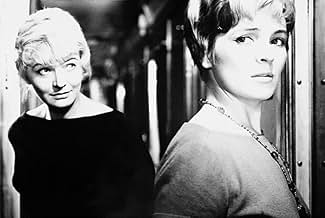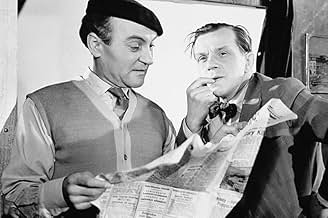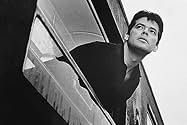Pociag
- 1959
- 1 घं 39 मि
IMDb रेटिंग
7.7/10
3.9 हज़ार
आपकी रेटिंग
अपनी भाषा में प्लॉट जोड़ेंJerzy enters a train set for the Baltic coast. He seems to be on the run from something, as does the strange woman with whom he must share a sleeping compartment.Jerzy enters a train set for the Baltic coast. He seems to be on the run from something, as does the strange woman with whom he must share a sleeping compartment.Jerzy enters a train set for the Baltic coast. He seems to be on the run from something, as does the strange woman with whom he must share a sleeping compartment.
- निर्देशक
- लेखक
- स्टार
- पुरस्कार
- 2 जीत और कुल 1 नामांकन
Andrzej Herder
- Sailor
- (बिना क्रेडिट के)
Barbara Horawianka
- Jerzy's Wife
- (बिना क्रेडिट के)
फ़ीचर्ड समीक्षाएं
It is marvellous that this magnificent Polish classic has been made available in 2011 in a restored version on DVD with English subtitles. The film, in crisp black and white with extremely creative camera work, is a joy to watch. In many ways it resembles the Western noir films of the late forties and early fifties, but it has psychological depth and is not just a thriller. In many ways it reminds me of a high-quality noir such as Nicholas Ray's IN A LONELY PLACE (1950, see my review), where loneliness and tragic encounters are really the main theme. That film's theme was 'I loved you for a few weeks', but in this film the love lasts for but a day. NIGHT TRAIN (POCIAG in Polish, which merely means 'train', though in an earlier release for the cinema, the film was known in English as BALTIC EXPRESS) takes place mostly on a train, and train films are always such a great favourite, being a perfect metaphor of life. This aspect is intensively stressed by the director, with his shots of the many separate carriages and compartments, both full and later empty. The moving shots up and down the crowded corridors seem to be a miracle of planning, and give every appearance of having been shot on a real moving train. But some of it was done in a studio with removable walls, to enable this seemingly impossible camera movement to take place. The camera never stops, it roams restlessly like a wild beast through this moving Noah's ark of humanity, seething as it is with mystery, fear, an escaping murderer, a woman with murder in her heart, a despairing wife trapped in a hopeless marriage, and even a survivor of Buchenwald who cannot sleep in a bunk because it reminds him of the concentration camp, so that he spends all his time in the corridor reading, until he drops off. They are all supposed to be going off on holiday to the seaside, a town called Hel. The dramas meanwhile are swirling round everyone as they tensely smoke their cigarettes and fret about the dangers of a killer in their midst, and make furtive assignations. The train stops at night at a place where it has never stopped before, and three policemen get on, in search of the man who has just murdered his wife. Which of the mysterious men on the train is really the murderer? The astonishing scene where the murderer leaps from the moving train and all the men go after him in a mob scene and trap him in a ramshackle cemetery is meant to be a metaphor for the seamy side of Poland's recent history. The Polish government had banned jazz music until the reforms of 1956, so this film has a defiantly jazz soundtrack all the way throughout, though soft, dreamy, and haunting. The atmosphere of the film is electric but also mesmerizing. There are long periods of brooding and contemplation, and many characters barely speak, while others chatter uncontrollably. The focus of the film is on the mysterious blonde beauty, played by Lucyna Winnicka, who says little, and after this film was shot, married the director. She conveys so much by her eyes and expressions and moods that there is little need for dialogue. The film was directed by Jerzy Kawalerowicz (1922-2007), who made 17 films between 1952 and 2001, of which this, PHARAOH (1966), QUO VADIS? (2001), and MOTHER JOAN OF THE ANGELS (1961) are the most famous. In NIGHT TRAIN, he shows himself to be a master of the cinematic craft. The film is continuously absorbing, thoughtful but paced, and deeply intriguing. Like life, it does not answer all of its mysteries, and happiness remains elusive. One of the most frustrated and disappointed of the characters is played by the famous actor, Zybigniew Cybulski, as an eager young man who simply cannot comprehend his rejection by Winnicka, or even begin to understand her new and impenetrable air of gloom and inevitable fate. When fate takes an unexpected turn, the defeat of inevitability itself has the taste of exchanging one emptiness for another. Empty compartments, empty lives; a speeding train, life's hurtling express in which we all are carried. This is one of the finest of the many 'train films'.
Sadly, I can't agree with most people who find this film to be Hitchcockesque in its representation of a thriller.
To say this would be to say that your Jaguar is just like a Mercedes. They might both be fine cars, but they are in no way alike.
The really quite simplistic plot travels at a slow and in many ways, inexplicable pace. There is little tension built up, and, for the most part, little mystery to be found.
However, don't take any of this to be a retrograde description.
The various small character subplots and interactions are wonderful. The whole journey has a quite haunting feel to it, which I find I am at loss to explain, because if I analyse the film, there is no real reason to this feeling. And yet, there it is.
The beautiful and mysterious Lucyna Winnicka is utterly mesmerising.
In so many ways this film shouldn't work with anything like the power it achieves, but somehow it does. If it captures you in the way it has me, then it will stay with you long after the event, from the strange individual passengers right down to the oh so ethereal soundtrack.
I am without explanation, but I truly hope it gives you the feeling of something wonderful it gave me.
To say this would be to say that your Jaguar is just like a Mercedes. They might both be fine cars, but they are in no way alike.
The really quite simplistic plot travels at a slow and in many ways, inexplicable pace. There is little tension built up, and, for the most part, little mystery to be found.
However, don't take any of this to be a retrograde description.
The various small character subplots and interactions are wonderful. The whole journey has a quite haunting feel to it, which I find I am at loss to explain, because if I analyse the film, there is no real reason to this feeling. And yet, there it is.
The beautiful and mysterious Lucyna Winnicka is utterly mesmerising.
In so many ways this film shouldn't work with anything like the power it achieves, but somehow it does. If it captures you in the way it has me, then it will stay with you long after the event, from the strange individual passengers right down to the oh so ethereal soundtrack.
I am without explanation, but I truly hope it gives you the feeling of something wonderful it gave me.
Although it has superficial similarities with Hitchcock films (it's in black and white; it takes place on a train; it's a murder mystery; there are plenty of red herrings and misleading clues), I loved this moody Polish film because it is visually stunning and refreshingly free of Hollywood clichés. I saw a lot of Expressionist influence in the artfully planned staging and unusual camera angles, both inside the cramped railway corridors and outside the train in various stops along the route. The film is fairly demanding on the viewer: there are a lot of secondary characters with complicated stories of their own, and I found myself repeatedly pausing the DVD to catch details that I had missed. The final scenes were intricately choreographed and highly stylized, reminiscent of black-and-white-era Fellini. Not for everyone, but I found it delightful and plan to watch it again.
10gombro
The film beautifully depicts the reality of trains, possibly not only those running in Poland but also all over the world. The claustrophobic atmosphere of the train brings people together and lets the viewers plunge into the story and its rhythm. Beautiful black and white pictures and melancholic jazz theme bring to mind other films form the era. What makes the film even more attractive is the final turning point and sudden change in the behavior of the passengers. The only regretful fact is that such intimate,subtle films are not made anymore. Great pity.If it was made in English by lets say Orson Welles it would have been a cult movie for sure all over the world just as it is in Poland.
You know from the first minute that this is a different kind of train thriller. The first shots are in the station, lots of people bustling about, but instead of "busy" music on the soundtrack, the music here is slow, and it is cool jazz. This sets up the detached tone from the beginning. Some of the characters are nervous, even hysterical, but the director keeps everything at arm's length.
The story is very simple: A man on the train is fleeing after killing his wife. It is not known whether he is alone or with a woman. The movie concentrates on two couples, a single woman, and a single man. The three women move between the men--are they ordinary women looking for companionship, or is one of them trying to help, or escape from, the killer?
The scene in which the murderer is caught will recall the same scene in M and, of course, since the movie is Polish, the hunting down of fleeing, terrified people which so recently happened on Polish soil. The photography, excellent throughout, is especially beautiful and powerful in this scene. The director makes us aware of the symbolism, but not in an obtrusive way. The man who picks up the Cross and what he does with it quietly makes the point that the murderer and his pursuers are not different in kind, only in degree.
The story is very simple: A man on the train is fleeing after killing his wife. It is not known whether he is alone or with a woman. The movie concentrates on two couples, a single woman, and a single man. The three women move between the men--are they ordinary women looking for companionship, or is one of them trying to help, or escape from, the killer?
The scene in which the murderer is caught will recall the same scene in M and, of course, since the movie is Polish, the hunting down of fleeing, terrified people which so recently happened on Polish soil. The photography, excellent throughout, is especially beautiful and powerful in this scene. The director makes us aware of the symbolism, but not in an obtrusive way. The man who picks up the Cross and what he does with it quietly makes the point that the murderer and his pursuers are not different in kind, only in degree.
क्या आपको पता है
- ट्रिवियाStaszek, the young man following Marta, is seen several times getting on the train after it has started moving. The inspector warns him a couple of times that it is dangerous. Zbigniew Cybulski who plays Staszek died a few years later, aged 39, after falling under a moving train he was attempting to board at Wroclaw Glowny railway station in Poland.
- कनेक्शनFeatured in Fejezetek a film történetéböl: A lengyel film (1990)
टॉप पसंद
रेटिंग देने के लिए साइन-इन करें और वैयक्तिकृत सुझावों के लिए वॉचलिस्ट करें
- How long is Night Train?Alexa द्वारा संचालित
विवरण
- चलने की अवधि
- 1 घं 39 मि(99 min)
- रंग
- ध्वनि मिश्रण
- पक्ष अनुपात
- 1.37 : 1
इस पेज में योगदान दें
किसी बदलाव का सुझाव दें या अनुपलब्ध कॉन्टेंट जोड़ें

